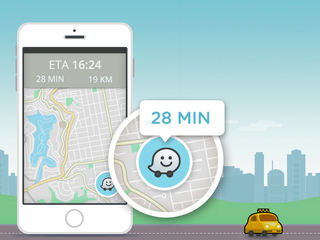
Uber users can now “auto-expense” their work rides
Anyone using Business Profiles today can now automatically send expenses to providers
In the old days, people traveling for business not only had to take taxis but they also had to remember to ask for (and save) those easy-to-neglect receipts indicating the date, cab number, and total fare paid.

Now that they’ve dominated the entire taxi industry, Uber’s taking the next logical step by making it easier than ever for customers to expense the rides they take on business trips. The company announced today that it has integrated with several major expense providers, including SAP-owned Concur, Expensify, Certify, and Chrome River. The integration is available today for users of Uber Business Profiles, which first launched in November. That tool made it as simple as a couple taps to switch from your personal account to a supplemental profile for work or business. Now if you use an Uber Business Profile as well as one of the above expense providers, you can link the two so that a copy of the receipt for each ride is automatically sent to the provider for reimbursement.
The integration is available today for users of Uber Business Profiles, which first launched in November. That tool made it as simple as a couple taps to switch from your personal account to a supplemental profile for work or business. Now if you use an Uber Business Profile as well as one of the above expense providers, you can link the two so that a copy of the receipt for each ride is automatically sent to the provider for reimbursement.
“[W]e saw business travelers using Uber grow by 220 percent from 2014 to 2015,” said Barry Padgett, Chief Product Officer at Concur. “That’s a lot of receipts. We’re pleased to continue our partnership with Uber to make reimbursement of rides a simple experience for Concur customers globally.”
Auto-expensing their Uber rides will surely please the one million people already using Business Profiles today, and could very well encourage more individuals (and possibly even entire businesses) to sign up. Uber says cities where Business Profiles are already very popular include New York, San Francisco, Mexico City, New Delhi, and Bangalore.
Over the past few months, Uber and its primary U.S. rival Lyft have been playing a little game of leapfrog when it comes to announcing technology integrations. At the end of January, Lyft announced that it is one of the launch partners for Waze's Transport SDK, allowing third-party developers to integrate the navigation app’s offerings into their own apps and services. And before that Uber unveiled a pilot program using gyroscopes in its driver's smartphones to monitor ride data.
Given all the funding going into the sharing economy, and particularly ridesharing companies, the overarching question remains: Can they ultimately prove profitability and find a path to long-term viability?
Just two weeks ago, Uber raised another $200 million round of funding from LetterOne, a Luxembourg-based private equity and venture capital firm headed by Mikhail Fridman. Shortly thereafter, Uber CEO Travis Kalanick said in an interview that, while the company was profitable in the U.S., it was losing $1 billion a year competing against Didi Kuaidi in China. And then there's the news this week that Rocket Internet-backed Tripda, a carpooling service based in Brazil, has shut down just a year after raising an $11 million Series A round.
I spoke with Sarah Maxwell (communications at Uber) over the phone because I was curious whether today's announcement signals Uber going in the direction of full-blown enterprise models where business customers pay Uber for features like auto-expense. She pointed out that there's already an Uber for Business, which signed up over 50,000 companies (including Goldman Sachs and Salesforce) in its first year.
That said, she admitted that "Business Profiles" and "Uber for Business" are not completely connected yet, as being a user of one doesn't necessarily mean you're a user of the other. Still, it shows that Uber is serious about an enterprise model for growing its business.
Related Companies, Investors, and Entrepreneurs
Uber
Startup/Business
Joined Vator on
Uber is a ridesharing service headquartered in San Francisco, United States, which operates in multiple international cities. The company uses a smartphone application to arrange rides between riders and drivers.
Lyft
Startup/Business
Joined Vator on
Lyft is a peer-to-peer transportation platform that connects passengers who need rides with drivers willing to provide rides using their own personal vehicles.
Expensify
Startup/Business
Joined Vator on
Expensify does "expense reports that don't suck!" We do that by importing expenses and receipts straight from 94% of US credit cards and 82% of US smartphones (iPhone, BlackBerry, Android, and Palm Pre). Create, submit, and approve expense reports online via email. Export pre-categorized expenses to QuickBooks or FreshBooks, and reimburse online with direct deposit. Free for individuals and small businesses, $5/active-user/mo thereafter.
Related News


Uber adds another $200M from Luxembourg firm

Lyft beats Uber to integrating with Waze

